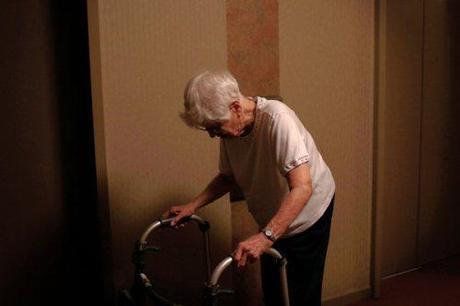With the assistance of improved sanitation and medical science, Americans are living longer.
But who wants to live to an old age being infirmed, incapacitated, and bed-ridden?

Katie Hafner reports for The New York Times, Nov. 2, 2014, that as the U.S. population ages and people live longer in bad shape, the number of older Americans who fall and suffer serious, even fatal, injuries is soaring.
Here are some alarming statistics:
- Falls are the leading cause of injury-related death for Americans over 65.
- In the decade from 2002-2012, more than 200,000 Americans over 65 died after falls. .
- The number of people over 65 who died after a fall reached nearly 24,000 in 2012, the most recent year for which fatality numbers are available — almost double the number 10 years earlier, according to the Centers for Disease Control and Prevention (CDC).
- More than 2.4 million people over 65 were treated in emergency departments for injuries from falls in 2012 alone, an increase of 50% over a decade.
But there’s good news!
Though the risk of a fall increases significantly once people reach their 80s, researchers have found that people 85 and older in excellent health have no greater risk than someone 20 years younger.
So what’s the recipe for healthy ageing?
You already know it. It’s what you’ve been told for ages:
- Eat sensibly and nutritiously
- Exercise
- Moderate drinking
- Don’t get fat
- Never, ever smoke
Those 5 Golden Rules are also entirely consistent with what we are told in 1 Corinthians 6:12-18, to treat our bodies with honor and respect because we are not our own, for we have been purchased at a price.
Sarah Knapton reports for The Telegraph, Oct. 30, 2014, that in 1979, 2,500 men were asked to follow five simple rules – eat well, work out, drink less, keep their weight down and never smoke.
After nearly four decades, just 25 of those men have managed to stick to the plan. But they are all far fitter and healthier than those who gave up. Those who stuck to the plan have dramatically cut their risk of cancer, diabetes, heart-attack, stroke and dementia.
Some examples:
- Retired teacher Leighton Jones, 80, bicycles 35 miles a week around the hills and valleys near his home in Caerphilly, South Wales and walks up to two miles every other day. “I have followed the healthy steps for many years now and feel pretty fit. Cycling keeps my body fit while scrabble keep the mind fit,” he said. “I do have a beer or wine most nights but I drink in moderation.”
- Ray Grace, 80, also kept up with the regime for 35 years. He travels all over Wales and the West Country refereeing college American football matches and walks and jogs two miles every day near his home in the village of Llanbradach. He said: “I’ll go on as long as I am able to. I’ve been refereeing for nearly 30 years now and still get a thrill out of it. As far as I’m concerned it’s been a great success. It has been invaluable for me and I’m pleased to have been part of it. I’ve stuck pretty well to the healthy lifestyle laid down and met with the researchers half a dozen times over the years.”
The volunteers, all from Caerphilly gave researchers regular reports of their physical activity, alcohol consumption, and diet. Their wives and families helped by completing regular food frequency questionnaires. Every five years the men were re-questioned and re-examined along with their medical records to identify new cases of diabetes, heart disease and strokes.
The researchers found non-smoking, an acceptable BMI (body mass index), a high fruit and vegetable intake, regular physical activity, and moderate alcohol intake were associated with reductions in the incidence of certain chronic diseases.
The recommended physical activity was to walk two or more miles each day, cycle 10 or more miles each day, or regular “vigorous” exercise.
Study leader Professor Peter Elwood, of Cardiff University, said: “As a nation, we must wake up to the preventive power of living a healthy life. Thirty years ago, only 25 men in our study followed all five of our recommended healthy steps. Following these steps did not give them complete protection against disease but the men who developed a disease, did so at a much older age than the men neglectful of their lifestyle. The development of heart disease was delayed by up to 12 years, and it was up to around an additional six years before dementia took its grip. It shows that following a healthy lifestyle staves off disease and premature death.”
Alzheimer’s Society Research Communications Manager Clare Walton said: “We have known for some time that what is good for your heart is also good for your head. The landmark Caerphilly study, part funded by Alzheimer’s Society, showed that healthy living can reduce the chances of dementia by up to 60%.“

So if you’ve already lapsed or have given up on your New Year’s resolutions to exercise, eat right, drink less, stop smoking, and lose some weight, don’t berate yourself. You’re only human! Instead, make ONE health resolution and begin doing it today. One baby step at a time.
I’ll think of you and imagine that you’re with me when I do my hilly walk this afternoon!
~Eowyn

